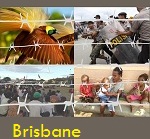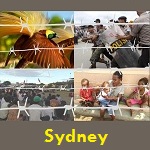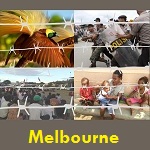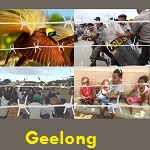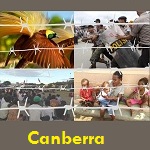The new law allows police to hold suspects for up to 221 days in detention before they are brought to court, allows the military to join police in counterterrorism operations, and expands the definition of terrorism along broad lines that may criminalize activist groups.
"We mainly have concerns with [the] articles that expand the definition of terrorism to include any kind of violence," said Papang Hidayat of Amnesty International Indonesia, as well as those that allow for prolonged detention. "In Indonesia, we still have a flawed criminal procedures court, inherited from Dutch colonial rule, which does not recognize rights like habeas corpus. Nor is torture considered a criminal act. So, the revised law raises major human rights concerns."
Civil liberties
The revised law passed after three days of discussion, according to Andreas Harsono, a researcher with Human Rights Watch in Jakarta. "The last three days were only used to argue about the definition of terrorism," he said.
The language in the law's Article 1.2 broadens the definition to include "violence or threat of violence which creates or intends to create an atmosphere of terror or widespread fear, creating multiple casualties and/or resulting in damage or destruction of vital strategic objects, the environment, a public facility, or an international facility with ideological, political or security disturbance motive."
Harsono said this could be used to target the peaceful activism of indigenous groups, environmentalists, and religious or political organizations.
One potential target of the revised law is Papuan activists, from the two contested easternmost provinces of Indonesia, Papua and West Papua, where the Indonesian government has been embroiled in a conflict with indigenous inhabitants for over five decades.
"There are two areas in Papua where criminals are tried against the state … Jayapura and Timika," said Harsono. "Thus, if you attack a point in Freeport [the world's largest gold mine, which is located in Papua] or a police officer in Freeport, you might technically be branded a terrorist."
Many countries have had to strike a balance between privacy and security in devising their counterterrorism laws, including the United States, which controversially expanded government surveillance with the Patriot Act after the attacks of Sept. 11, 2001.
Mitigating the impact
"The revised law was definitely a response to the recent attacks in Surabaya," Hidayat said.
Amnesty International Indonesia has written an open letter to the parliament with its concerns.
He is particularly worried about the growing role of the Indonesian military in counterterrorism operations.
"The Indonesian military has no accountability," he said. "They can only be tried in their [internal] tribunal system."
The move to involve the military in counterterrorism — in Article 43 of the revised law — came just days after the
Joint Special Operations Command, a domestic counterterrorism squad, was revived. Per the revised law, military involvement would require both a request from the police and the president's approval.
"The involvement of the military must be limited going forward," Hidayat said. "But this can only be done by presidential decree."
It is unlikely that Jokowi will roll back any provisions so soon after the revisions were pushed through, particularly since he is standing for re-election next year and national security will be a major policy issue.
The law was passed "in an effort to protect the entire nation and all the blood of Indonesia," Muhammad Syafii, chairman of the Special Committee for the Revision of Terrorism Law, said last week.
Officials in Indonesia's House of Representatives could not be immediately reached for comment.
Activists say the revised law could also further curb freedom of expression in Indonesia, which already has punitive blasphemy and defamation laws. Its Article 1.4 defines the threat of violence as "speech, writing, picture, symbol or body language, with or without electronic or non-electronic form which could create widespread fear."
——————————————————
2) INDONESIA: Summary executions recurring with impunity
Wednesday, 30 May 2018, 5:14 pm
Press Release: Asian Legal Resource Centre ALRC-CWS-38-002-2018
May 25, 2018
A Written Submission to the 38th Regular Session of the UN Human Rights Council by the Asian Legal Resource Centre
INDONESIA: Summary executions recurring while perpetrators enjoy impunity
The Asian Legal Resource Centre (ALRC) wishes to inform the UN Human Rights Council (UNHRC) regarding the situation of extrajudicial executions (summary executions) in Indonesia.
Despite being a state party to key international human rights treaties such as the International Covenant on Civil and Political Rights (ICCPR), the International Covenant on Economic, Social and Cultural Rights (ICESCR), and the International Convention against Torture and Other Cruel, Inhuman or Degrading Treatment or Punishment, Indonesia has yet to fully recognize the right to life and protection for all people from summary execution.
The right to life is also enshrined in the Indonesian Constitution (UUD 1945) and Law No. 39 of 1999 on Human Rights. The enforcement of such laws however, is Indonesia’s failing. In fact, law enforcement agencies and security forces in Indonesia are themselves guilty of summary executions. In the case of Mr. La Gode for instance, a resident of Taliabu Island, North Moluccas province, police officers arrested him for stealing cassava. Subsequently, Gode was transferred to the military post of Satgas 732/Banua for further examination. He was tortured in detention, and subsequently died from his injuries, particularly to his back and lateral parts of his body.
The ALRC’s sister organization, the Asian Human Rights Commission (AHRC) also documented the case of Gerri Goo, an indigenous Papuan who died after being shot by law enforcement agencies in Moanemani, Degiyai regency. Gerri was shot during a joint sweeping operation by the Moanemani police officers and the police mobile brigade (Brimob). Geri was hospitalized for 33 days, and he finally passed away on 9 May 2018.
In the past, particular under the regime of Suharto, summary executions occurred massively, and remains unpunished until present. Thousands, perhaps even one million people have been victims of summary execution during the 1965-1966 massacre, the mysterious shooting (Penembakan Misterius - Petrus) of 1981-1983, the Tanjung Priok case of 1984, the Talangsari case of 1989, the military operation and emergency period in Aceh from 1989-1998 and 2003, the 1998 May tragedy, the student shooting in Trisakti and Semanggi in 1998-1999, the case of Wasior and Wamena Papua 2001 and 2003, and various cases occurring in Papua, such as the cases of Puncak Jaya 1977-1978, as well as the Abepura case of 2000. Despite the Abepura case being prosecuted in the Makassar district court in 2005, the court failed to find evidence and finally released all the perpetrators. The government has also failed to address various recent cases of summary executions, such as the Paniai case, and the brutal attack and murder of Vijay Pauspaus in Sanggeng Manokwari Barat.
The recurrence of extrajudicial executions in Indonesia is largely due to the impunity enjoyed by the offenders, especially if they are part of the police or military institutions. For instance in the death of La Gode, the Sula Police Station prefers to internally discipline the police officers who had illegally arrested and transferred La Gode to the Military Post of Task Force (Satgas) 732/Buana. The internal ethic mechanism conducted on 31 March 2018 at the Sula Police Station ruled that:
1. Police Chief Brigadier Zaenuddin Ahmad was to get 21 days detention, one year suspension of rank, promotion and educational training.
2. Police Brigadier Harifin Idu was to get 21 days detention, two years suspension of rank, promotion, annulment of his current position in Police Administration and one year suspension of his regular salary.
3. Police Brigadier Mardin was to be punished with 21 days detention with six months suspension of educational training.
Extrajudicial execution committed by the police is also caused due to the lack of commitment by the government to implement internal police regulations on human rights. The Internal Police Regulation No. 8 of 2009 on the Implementation of Human Rights Principles and Standards in the Discharge of Duties of the Indonesian National Police, and the Standard Operational Procedures like the SOP No 1/X/ 2010 on Countermeasures on Anarchy, and SOP No 14 of 2012 on the Investigation Management of Crimes have all remained on paper thus far.
In view of the above situation, the ALRC requests the UN Human Rights Council to undertake studies to assess the root causes of extrajudicial executions in Indonesia. The Council should not merely work with the Indonesian government, but should also work and support the Indonesian civil society at large in dealing with recurrence and massive extrajudicial executions in Indonesia.
The Council should put pressures on the government of Indonesia so that the State officially invites and cooperates with the UN Special Rapporteur on Extra-judicial, Summary, or Arbitrary Executions.
————————————————
3) Sport: Wan Papua Warriors target London Nines
The Wan Papua Warriors want to take their message to the world at the London Rugby League Nines in July.
Formerly known as the West Papua Warriors, the team was formed to raise awareness about the on-going human rights abuses in the Indonesian province.
Team captain Tala Kami said the UK has a large Papua New Guinea and West Papuan population and, after playing at events in PNG and Australia, they see playing in London as a big opportunity.
"So the last time we played was in January last year at Cabramatta (in Sydney) and it's been over a year now," he said.
"We've just been looking for tournaments where we can play and raise the profile as much as we can internationally so London was obviously an opportunity to get to a place we've never been before and raise some awareness there."
"There's a large Papua New Guinean community in England, in London, and also a very strong West Papuan community in England including Benny Wenda, who is the face of West Papuan freedom campaign so he's well aware of us coming and him and his family are very excited as well," Kami said.
Tala Kami said organisers of the London Nines have no issue with their political stance.
"When we first contacted with them they didn't really know the story - they just saw us as another rugby league team, which was fine," he said.
"As they've done their research a little bit more they actually really embraced it and have been using our team and our message as one of the sort of flagship advertising points of this current tournament so no problems whatsoever, they've been very welcoming.”
The Wan Papua Warriors are fundraising to help pay for their trip but Tala Kami said they've already been offered free accommodation in London.
He said a lot of players in England are keen to be involved so only a few players will travel from PNG and they've mastered the art of low-bidget travelling
--------------------
